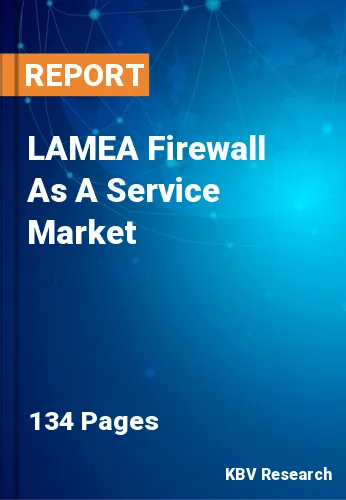The Latin America, Middle East and Africa Firewall As A Service Market would witness market growth of 24.6% CAGR during the forecast period (2022-2028).
It's crucial to start a firewall configuration by denying all traffic access to the network. Introducing rules and regulations will highlight the traffic allowed to connect to the network. By allowing access to only trusted traffic, blocking all devices and traffic by default reduces the danger of a data breach. In addition, all rules that permit traffic should be strictly regulated and have defined parameters. As a result, there will be less chance of malicious traffic using or exiting the network.
Managing firewalls is crucial, and giving too many users access to firewall settings carries a significant danger. Senior network administrators should have access, and any configuration changes should be watched carefully. Users should have various levels of access depending on the circumstances. User access should only be allowed if there is a business necessity and should be constantly reported and audited. The control of authorized users limits the risk of unintentional or malicious changes to settings and configurations.
One of the GCC region's fastest-growing digital health markets is predicted to be Saudi Arabia. Programs for digital transformation and healthcare IT have received a $1.5 billion budget from the government. To increase the accessibility and standard of treatment in rural locations, the MOH devised an e-Health plan that uses telemedicine. The adoption rate of telemedicine in Saudi Arabia is over 70%, and nearly 34% of young doctors utilize AI to speed up diagnostics. The largest virtual hospital in the world, Seha Virtual Hospital, was introduced by Saudi Arabia in the spring of 2022. The robust digital health infrastructure raises the risk of cyber attacks, which can compromise the data of numerous patients; that is why the need for a firewall as a service will surge in the region with the increase in digital health, propelling the market expansion in the region.
The Brazil market dominated the LAMEA Firewall As A Service Market by Country in 2021, and would continue to be a dominant market till 2028; thereby, achieving a market value of $179.2 million by 2028. The Argentina market is experiencing a CAGR of 25.3% during (2022 - 2028). Additionally, The UAE market would display a CAGR of 24.3% during (2022 - 2028).
Based on Enterprise Size, the market is segmented into Large Enterprises and Small & Medium Enterprises. Based on Type, the market is segmented into Compliance & Audit Management, Traffic Monitoring & Control, Security Management, Reporting & Log Management, Automation & Orchestration, Professional & Managed Services and Others. Based on Service Model, the market is segmented into Infrastructure as a Service, Platform as a Service and Software as a Service. Based on Deployment Model, the market is segmented into Public Cloud, Private Cloud and Hybrid Cloud. Based on Vertical, the market is segmented into BFSI, IT & Telecommunication, Retail, Education, Healthcare & Dental, Energy & Utilities, Manufacturing, Government and Others. Based on countries, the market is segmented into Brazil, Argentina, UAE, Saudi Arabia, South Africa, Nigeria, and Rest of LAMEA.
Free Valuable Insights: The Worldwide Firewall As A Service Market is Projected to reach USD 8.4 Billion by 2028, at a CAGR of 20.6%
The market research report covers the analysis of key stake holders of the market. Key companies profiled in the report include Cisco Systems, Inc., Juniper Networks, Inc., Fortinet, Inc., Zscaler, Inc., Palo Alto Networks, Inc., Check Point Software Technologies Ltd., Sophos Group PLC (Thoma Bravo), Cato Networks Ltd., Forcepoint LLC (Francisco Partners), and Barracuda Networks, Inc. (Thoma Bravo)
By Enterprise Size
By Type
By Service Model
By Deployment Model
By Vertical
By Country
Our team of dedicated experts can provide you with attractive expansion opportunities for your business.

